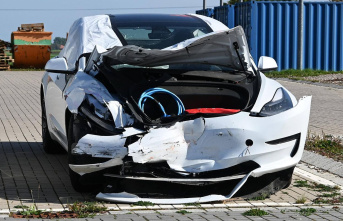The majority of the value created for investors on the German stock market comes from just a few stocks. A study by the Flossbach von Storch Research Institute shows that over the past 20 years, 1.7 trillion euros in value have been achieved through price gains, dividends and share buybacks.
The bottom line is that many German shares have not brought investors any money since January 2003, while twelve shares already account for half of the total value created, according to the institute of the Cologne-based asset manager of the same name. This underscores how easily investors can go wrong with investments in individual stocks.
For the study, all 1,000 shares of German companies that were publicly traded in the Prime Standard and General Standard segments of Deutsche Börse between the beginning of 2003 and December 2022 were analyzed. The experts measured the value creation of the shares against the yield on Bunds with a remaining term of one month in order to create a comparison with very short and safe investments - similar to money in the account in the years of low interest rate policy. Stock returns above those of such Bunds were defined as value creation. The start of the study was set for 2003 so that the stock market could be viewed from a low after the Neuer Markt collapsed.
1.7 trillion euros with 118 titles
The result shows the importance of dividends for shareholders: Of the total value created, they accounted for 52 percent. The remaining 41 percent came from price increases and 7 percent from share buybacks.
If you list the values created by all shares, the sum of 1.7 trillion euros is already reached with the first 118 titles, around 12 percent of the papers. Some stocks behind it also added value. However, the loss-makers ate up their contribution on balance.
"Only a few large, mostly well-managed companies in attractive sectors dominate the German stock market," says study author Philipp Immenkötter. "They have been listed for a long time and have grown over the years." Only six out of ten German stocks created value over the long term. The weak performance of the vast majority means for investors that "great caution is required when choosing stocks".
According to the study, the Dax companies Siemens, SAP, Allianz, Mercedes-Benz and Deutsche Telekom created the greatest value for investors, each with over 75 billion euros. It was followed by BASF, BMW, Volkswagen (common shares), Munich Re and Deutsche Post. The largest value destroyers since 2003 include the papers of Commerzbank, the real estate financier Hypo Real Estate and Deutsche Bank, which ended up in last place (1013) with almost 25 billion euros in value destruction.
However, the picture depends on the period under investigation: If Flossbach von Storch had started the analysis before the collapse of the Neuer Markt, Deutsche Telekom, for example, would have done worse.
The crash of the Telekom share, previously praised as a "people's share", shortly after the turn of the millennium is considered one of the reasons for the comparatively weak share culture in Germany. The number of shareholders rose to a record 12.89 million last year, according to data from Deutsches Aktieninstitut (DAI). However, the rate is sometimes significantly higher in other industrialized countries.
Experts advise a broad spread
Broad investments in equities have been profitable over the long term. According to the DAI, investors with Dax shares have been able to generate an average annual return of 8.2 percent over the past 20 years. Investments in global equities measured by the MSCI World index would have an annual return of 8.7 percent over the period.
Investors take high risks with individual stocks, even in large corporations. Experts therefore advise spreading stock market investments widely and globally, for example with funds or inexpensive exchange-traded index funds (ETFs) that do not require a fund manager. Because very few investors find the profit makers of the stock exchanges in the long run.
"We generally advise against investing in individual shares," says Niels Nauhauser, financial expert at the Baden-Württemberg consumer advice center. "Although there is a chance that investors will beat the broad market with individual stocks, it is small. Instead of looking for a needle in a haystack, it is better to buy the whole haystack."
Focus on profiteers
Nauhauser also advises investors to use ETFs that simply map an index, such as the MSCI All Countries World stock index. Because the lower the costs, the higher the long-term return. Investors looking for high ongoing income payouts could also look to global dividend ETFs.
The concentration of profit-makers on the stock exchange is not a German phenomenon, explains Nauhauser. A 2018 Arizona State University study showed that out of 25,000 US stocks studied since 1927, only 86 stocks have accounted for half of the stock market's return. Less than half of the 25,000 stocks have any positive lifetime returns, including dividends.
Is it worth looking at which stocks have performed best in previous years? This is not good advice, says Nauhauser. "The top performers of the past do not have to be those of the future." Many bank stocks were doing well on the stock exchange before the global financial crisis, but then they were particularly bad.








